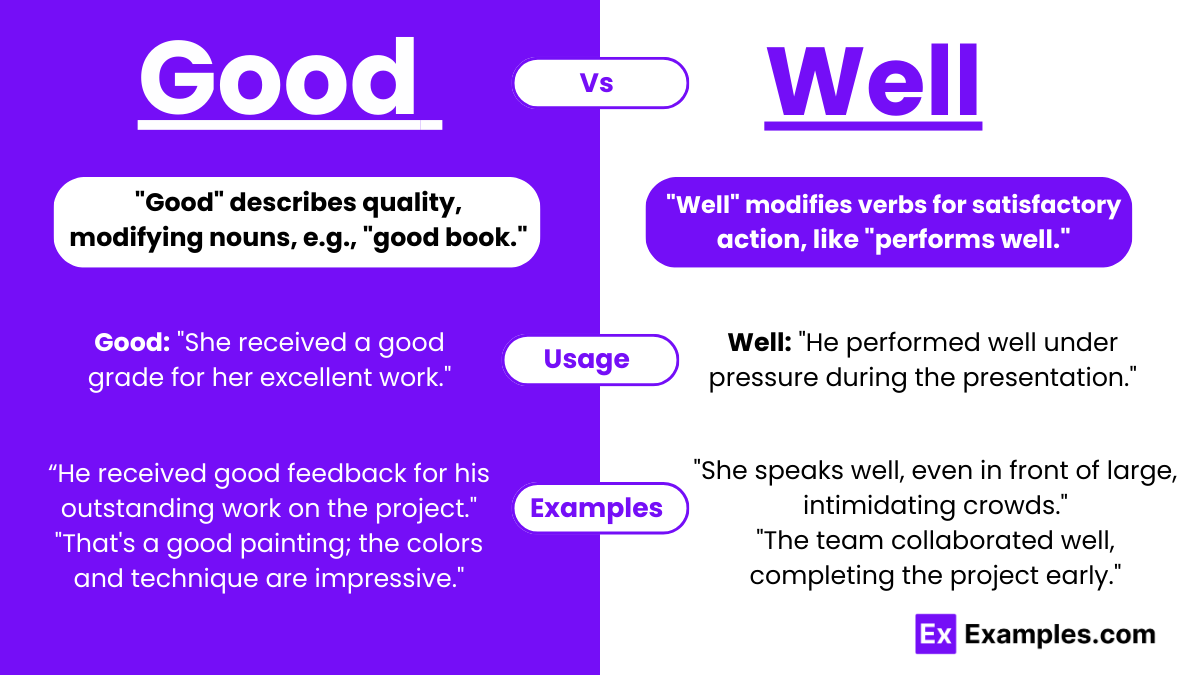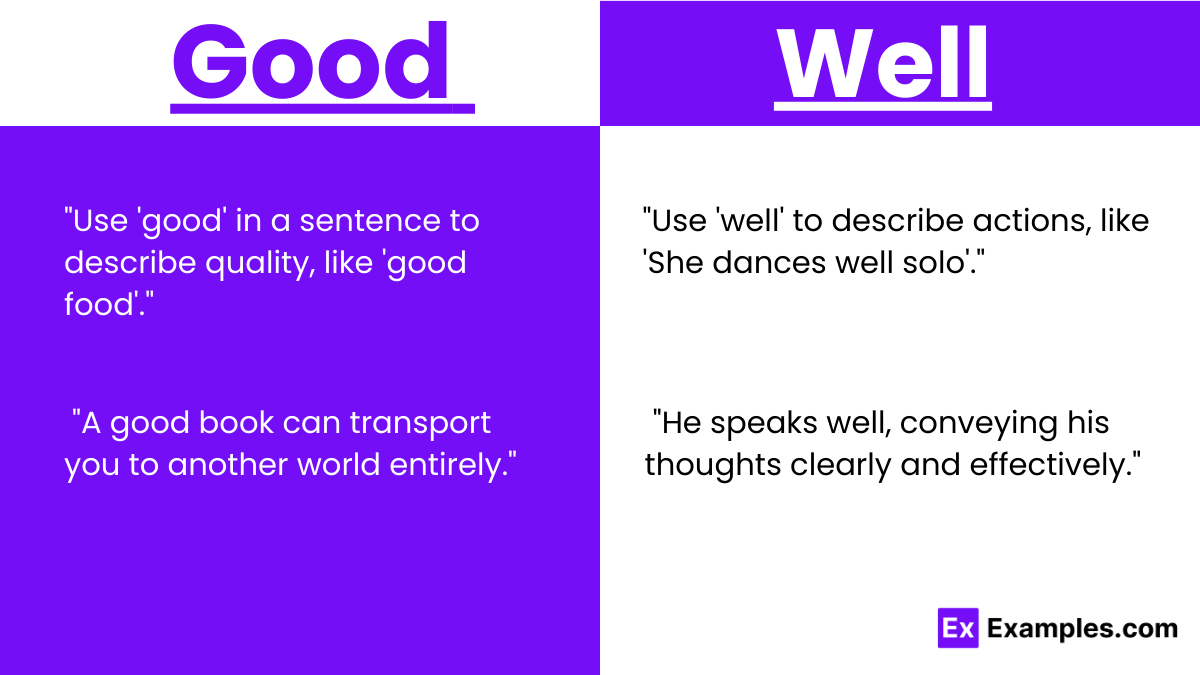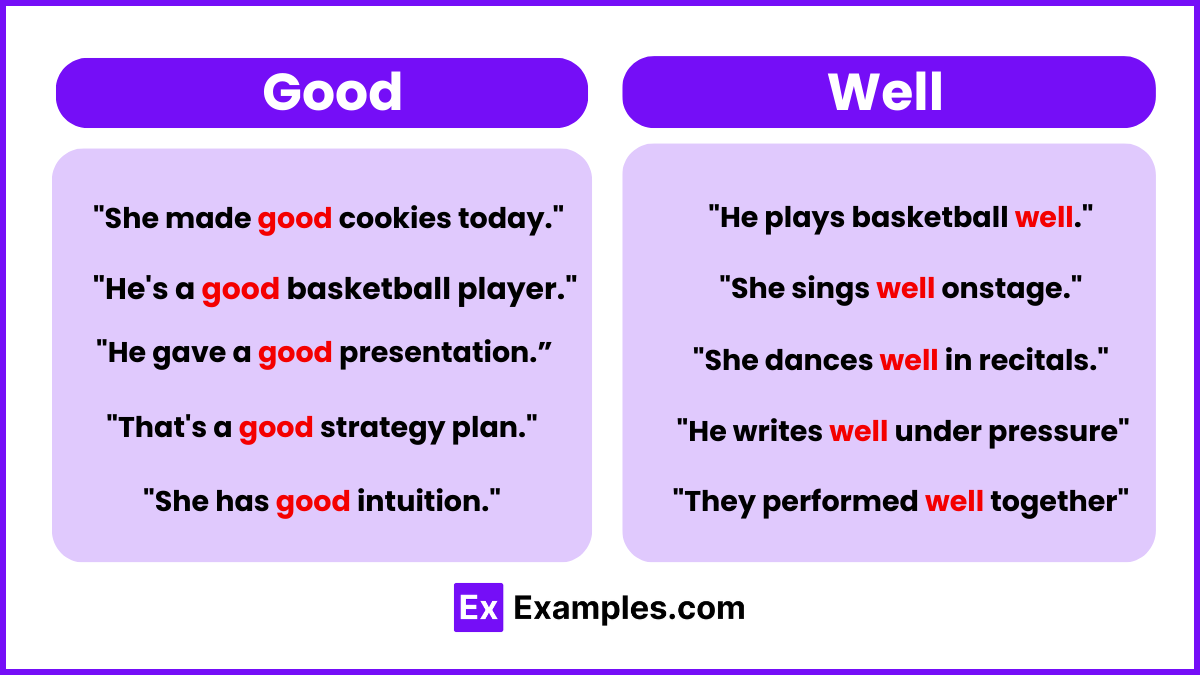Good vs Well – Examples, Differences, Usage, Tricks
Embarking on a journey through the English language reveals a landscape rich with nuance and precision, where the choice of a single word can color an entire sentence. Among the most commonly navigated paths in this journey is the distinction between “good” and “well.” This exploration is not just about grammar; it’s a quest for clarity, a mission to express oneself accurately. As we delve into the realms of “good” versus “well,” we venture beyond mere rules, touching the essence of effective communication. This article aims to guide students through the intricacies of these terms, empowering them to wield them with confidence and precision in their academic and everyday language. Join us as we demystify these terms, enhancing your linguistic arsenal and elevating your expression from merely passable to truly eloquent.
“Good” and “Well” – Meanings
- “Good” is an adjective that describes something as being of high quality, virtuous, or desirable. It is used to modify nouns and pronouns. For example, “She received a ‘good’ score on her exam,” or “That is a ‘good’ book.”
- “Well” is an adverb that describes an action as being done in a satisfactory or competent manner. It modifies verbs, adjectives, and other adverbs. For example, “He performs ‘well’ in high-pressure situations,” or “She is ‘well’ aware of the consequences.
“Good” is an adjective that describes nouns and pronouns, indicating quality, proficiency, or desirability. For example, “She is a good teacher” shows that the teacher is skilled. “Well,” on the other hand, is an adverb that modifies verbs, adjectives, or other adverbs, often referring to health or satisfactory performance. For instance, “He performs well in exams” indicates competence in taking exams. Both words are used to express positive attributes but in different grammatical contexts”Summary
How To Pronounce Good and Well
To pronounce “good,” start with a hard “g” sound (like in “go”), then add the “oo” sound (as in “food”), and end with a “d” sound (like in “dog”). It should sound like /ɡʊd/.
For “well,” start with a “w” sound (like in “water”), then add the “e” sound (as in “pet”), and end with an “l” sound (like in “love”). It should sound like /wɛl/.
Difference Between Good and Well
| Aspect | Good | Well |
|---|---|---|
| Definition | Describes something of high quality or competence | Describes an action done in a satisfactory manner |
| Context | Used with nouns and pronouns to describe their quality | Used with verbs to describe how an action is performed |
| Usage | To express approval, desirability, or suitability | To indicate the manner, condition, or degree of an action |
| Connotation | Positive, indicating satisfaction or excellence | Generally positive, focusing on performance or state |
| Field | Broad usage across various contexts, from personal to professional settings | Often used in health, performance, and evaluative contexts |
| Synonyms | Excellent, fine, superior | Competently, properly, satisfactorily |
| Antonyms | Bad, poor, inferior | Badly, poorly, inadequately |
| Derivatives | Goodness (noun) | Well-being (noun), well-done (adjective) |
| Examples | “She did a good job.” | “He speaks English well.” |
| Pronunciation | /ɡʊd/ | /wɛl/ |
Tricks to Remember Good and Well
1. Good is an Adjective, Well is an Adverb
- Good modifies nouns. It describes or gives more information about a noun. Use “good” when talking about a thing, person, or place.
- Example: She is a good teacher. (Here, “good” describes the noun “teacher”.)
- Well modifies verbs, adjectives, and other adverbs. It’s used to talk about how something is done. Use “well” when you’re discussing how someone does something.
- Example: He plays guitar well. (Here, “well” describes how he plays, which is the action or verb.)
2. The “How” Trick
- If you can replace the word with “how,” then “well” is likely the correct choice.
- Example: She sings well. (Think: How does she sing? She sings “how” = well.)
3. The “Sense” Trick
- “Well” is often used when talking about health.
- Example: I don’t feel well today.
4. Substitution with a Similar Adjective or Adverb
- If you can substitute the word with another adjective (like “great”) and the sentence still makes sense, use “good.”
- Example: That sounds good. (That sounds great.)
- If you can substitute it with another adverb (like “efficiently”) and the sentence still makes sense, use “well.”
- Example: She writes well. (She writes efficiently.)
5. Use “Good” with Sensory Verbs
- With verbs that pertain to the senses (feel, taste, look, smell, sound), “good” is often correct.
- Example: This tastes good. (Even though it seems like you’re describing how it tastes, with sensory verbs, “good” is used to describe the state of the thing being perceived.)
6. Exception: “Well” as an Adjective
- Be aware that “well” can also be an adjective when talking about health.
- Example: After the surgery, he was well again.
When to use Good and Well
Usage of “Good”
- Describing Nouns: Use “good” to describe a person, place, thing, or idea (e.g., “a good book”).
- Qualitative Assessments: For expressing the quality of something (e.g., “This cake tastes good”).
- Health and Well-Being: Referring to someone’s health or state (e.g., “I don’t feel good today”).
- Moral Rightness: When discussing morality or ethics (e.g., “a good deed”).
- Suitability or Adequacy: Indicating suitability for a purpose (e.g., “This is a good day for a picnic”).
- Skill or Competence: Describing someone’s ability (e.g., “She is good at singing”).
- Pleasantness: When something is enjoyable or pleasurable (e.g., “We had a good time”).
- Thoroughness or Completeness: To denote something done thoroughly (e.g., “He gave it a good clean”).
- Reliability or Soundness: For something that can be relied upon (e.g., “a good reason”).
- Prosperity or Well-Being: Wishing someone well (e.g., “Good luck!” or “Good night!”).
Usage of “Well”
- Modifying Verbs: Use “well” to describe how an action is performed (e.g., “She sings well”).
- Health: Specifically in reference to health (e.g., “I hope you get well soon”).
- Satisfactory Performance: When discussing performance or outcomes (e.g., “The project went well”).
- In Comparisons: As part of comparative structures (e.g., “She performed well compared to others”).
- In Expressions: Within idiomatic expressions (e.g., “All’s well that ends well”).
- Describing Conditions: To describe conditions or states (e.g., “The plan is well thought out”).
- Modifying Adjectives: Before adjectives to emphasize (e.g., “well aware”, “well deserved”).
- To Indicate Sufficiency: Signifying enough or sufficiently (e.g., “The documentation is well provided”).
- In Greetings or Farewells: As part of polite expressions (e.g., “Well, it was nice meeting you”).
- To Express Surprise or Emphasis: In phrases indicating surprise or emphasis (e.g., “Well, what do we have here?”)
How to Use “Good” and “Well”
- Describing Physical Objects or Experiences: Use “good” when you’re talking about the quality of something you can see, touch, taste, or feel. Example: “That was a good meal.”
- Assessing People’s Nature or Behavior: “Good” is suitable for evaluating someone’s moral character or actions. Example: “He is a good person.”
- Commenting on Performance Non-specifically: When you’re not detailing how well someone did something, but rather making a general positive statement. Example: “You did a good job.”
- Expressing Satisfaction or Approval: It’s used when you approve of something or someone. Example: “This is good work.”
- Wishing Someone Well: In expressions that convey good wishes or hopes for someone. Example: “Have a good day.”
How to Use “Well”
- Modifying Actions (Verbs): Use “well” when you want to describe how an action is performed. Example: “She plays the piano well.”
- Referring to Health: Specifically when talking about someone’s physical or mental health. Example: “I hope you feel well soon.”
- In Response to “How are you?”: It’s appropriate to use “well” as a response to inquiries about your state of being. Example: “I am well, thank you.”
- Before Past Participles and Adjectives: When “well” is used to modify past participles or adjectives to convey the extent or quality of something. Example: “He is well known in the community.”
- To Indicate Thoughtful or Careful Consideration: When something has been well considered or planned. Example: “This strategy is well thought out.”
Good vs Well– Examples
Examples of “Good”
- “The good book she read last week inspired her deeply.”
- “He received good news about his job application yesterday.”
- “Their good performance in the tournament earned them a trophy.”
- “She always had a good understanding of complex subjects.”
- “They found a good spot for camping in the woods.”
Examples of “Well”
- “She did well on her exams despite the difficult questions.”
- “The team worked well together, completing the project on time.”
- “He speaks well, captivating his audience with every word.”
- “They planned the event well, ensuring everything ran smoothly.”
- “She adjusted well to her new job within a few days.”
Synonyms For Good vs Well
| Good Synonyms | Well Synonyms |
|---|---|
| Excellent | Excellently |
| Superior | Admirably |
| Admirable | Proficiently |
| Exceptional | Competently |
| Outstanding | Skillfully |
| First-rate | Effectively |
| Quality | Efficiently |
| Superb | Aptly |
| Splendid | Capably |
| Fine | Favorably |
| Exemplary | Thoroughly |
| Marvelous | Successfully |
| Great | Satisfactorily |
| Wonderful | Masterfully |
| First-class | Impressively |
Exercise
Fill in the blank with the correct form of “Good vs Well”:
- She plays the violin _______.
- This is a _______ example of classical architecture.
- He did _______ on his math test.
- The food smells _______.
- They worked _______ together to solve the problem.
- This painting looks _______ on your wall.
- She felt _______ after her morning workout.
- The story was written _______.
- Your English has gotten _______ since last year.
- That’s a _______ point you made in the discussion
Answers
- well
- good
- well
- good
- well
- good
- well
- well
- good
- good
FAQs
1. Can “good” and “well” be used interchangeably?
No, “good” is an adjective, which means it describes nouns and pronouns. “Well” is primarily an adverb, describing how an action is performed. Their interchangeability is limited to specific contexts, such as when discussing health.
2. How do I use “good” and “well” when talking about health?
When speaking about health, “I am good” can be casual or informal, implying general well-being, while “I am well” is more grammatically correct and specific to physical or mental health.
3. Is it ever correct to use “good” with verbs?
“Good” should not be used directly with verbs. Instead, it describes the subject or object of a sentence. However, in informal speech, people often use “good” with linking verbs, such as “to be,” to describe their state of being.
4. Can “well” be used as an adjective?
“Yes, “well” can be an adjective when it describes someone’s health. For example, “She is feeling well today.”
5. What are some examples of “good” and “well” used in a sentence?
- Good: “He is a good painter.” (Describes the noun “painter.”)
- Well: “He paints well.” (Describes the verb “paints.”)
Understanding the correct use of “good” and “well” is crucial for effective communication in English. “Good,” an adjective, describes nouns and pronouns, indicating quality or desirability. “Well,” an adverb, modifies verbs, adjectives, and other adverbs, often related to manner or health. Mastery of these words enhances clarity and precision in language, allowing speakers to accurately convey evaluations, states of being, and actions.




